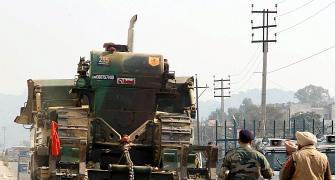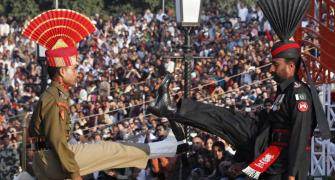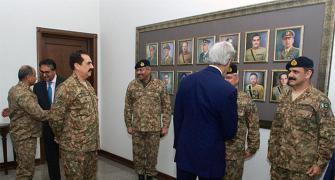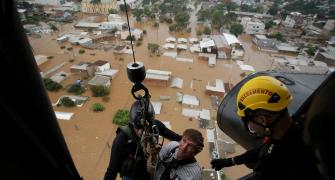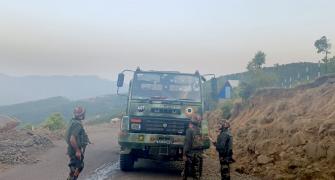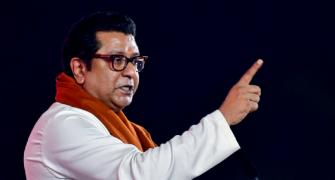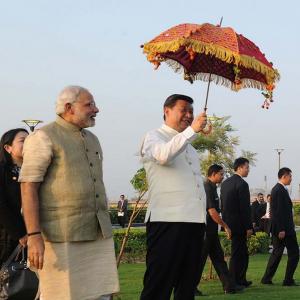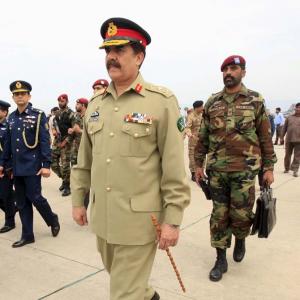'Pakistanis are very clever in manipulating us,' former Bush administration official tells US lawmakers.
Rediff.com's Aziz Haniffa reports from Washington, DC.
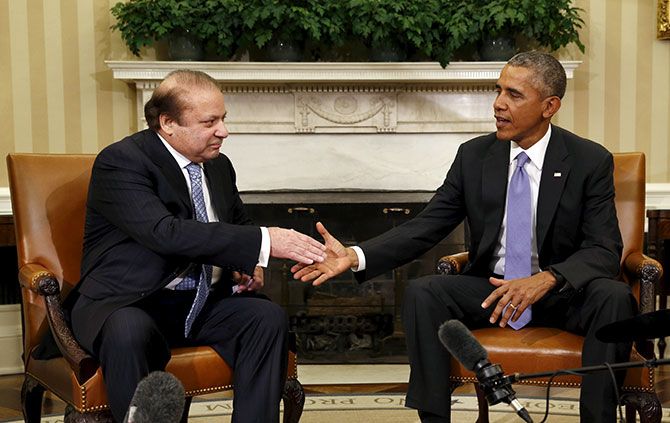
Afghan-born Zalmay Khalilzad, erstwhile senior diplomat in the George W Bush administration, pulled no punches when told US lawmakers on Tuesday, July 12, that Pakistan was a State sponsor of terrorism.
Testifying before a joint hearing of the House Foreign Affairs Subcommittees on Terrorism, Non-proliferation and Trade and Asia and the Pacific on the topic of 'Pakistan: Friend or Foe in the Fight against Terrorism', Khalilzad, who was the United States Ambassador to the United Nations and the US envoy to Afghanistan and Iraq, not only strongly recommended conditioning US aid to Pakistan, but also asked to put Pakistan on the US State Department's list as a State sponsor of terrorism.
Khalilzad was of the opinion that the US needed to work with India on combating terrorism emanating from Pakistan and in taking up the issue in the United Nations Security Council.
He called for the Washington to strip Pakistan of the non-NATO ally status it had accorded Islamabad several years ago.
While acknowledging that Pakistan in the aftermath of 9/11 'did provide significant help in the overthrow of the Taliban and in the capture of quite a number of Al Qaeda members,' Khalilzad said, 'Pakistan is now a State sponsor of terror.'
'There is no question that the Pakistan military and the Pakistani intelligence agency -- the Inter Services Intelligence -- support the Haqqani network, which we regard as a terrorist organisation,' he said.
'One of our former chairmen of the joint chiefs (of staff, Admiral Mike Mullen) called the Haqqani Network a virtual arm of the ISI,' he added.
'It is also clear that the Pakistani military and Pakistani intelligence provide sanctuary and support for the Taliban, which is an extremist organization, that provided sanctuary for Al Qaeda in the early period,' Khalilzad said, while adding, 'even recently, the leader of Al Qaeda, (Ayman al-) Zawahari pledged allegiance to the new leader of the Taliban. So, that relationship continues.'
 'The Pakistani support for these two groups has been a critical factor in my judgment in the longevity and successes that these two groups have had against the United States and against our forces,' Khalizad, left, said.
'The Pakistani support for these two groups has been a critical factor in my judgment in the longevity and successes that these two groups have had against the United States and against our forces,' Khalizad, left, said.
'We've lost quite a lot of people, military in particular and they've imposed huge financial costs by making the war prolonged, much harder, more protracted,' Khalilzad said.
A US policy changed toward Pakistan was imperative as the old policy of providing Islamabad with massive American assistance had not changed Pakistan's behaviour, he argued.
'When you want to discourage bad behaviour, you have to do things that look like punishment or imposing costs to shape a response,' Khalilzad said.
'Pakistan has believed correctly that they can get aid in billions and get support and continue to do these things and we will not confront them with the choice of either take our assistance or stop what you are doing and there would be no assistance,' he said.
'We need to have, in my judgment, sharply focused sanctions against people in these two institutions -- the military, especially the army and the intelligence network -- who are involved in support of the Haqqani Network and the Taliban. That would mean financial sanctions and in my view would also mean travel to the United States,' Khalilzad said.
'We need to also suspend all non-humanitarian and non-educational assistance to Pakistan,' he added.
The former diplomat said these financial sanctions should not only be US sanctions, but also in the form of IMF (International Monetary Fund) too.
'We need to use our influence there to make sure that the next package which is likely to come up later this summer or early fall does not go through without Pakistan taking the necessary measures with regard to these two groups,' he said.
'We ought to consider, deliberate, debate, whether Pakistan should not be put on the State Department's list of State sponsors of terrorism. Factually it is. Now the question is, what are the pros and cons, and I think there are costs for us not doing this because the whole list loses its legitimacy when a state clearly is doing something and we are not calling a spade a spade,' Khalilzad asserted.
He also argued that calling Pakistan a major non-NATO ally given what it is doing, also raises questions of the legitimacy of such a designation.
'We ought to signal that without a change on these two issues, we would recalibrate, reconsider that designation and I would think that we also ought to, as we do with North Korea -- a country that has nuclear weapons, but has many hostile, negative, domestic and external policies -- consider as to when we might take the whole issue to the UN Security Council in collaboration with the Afghans to expose Islamabad,' Khalilzad said.
'We have not done as much as we can to expose the details of how this policy of support to the Haqqani Network and Taliban are actually conducted by Pakistan. The implications, the ramifications of that in terms of the damage it has done to fellow Muslims in Afghanistan, besides the killings that have taken place of the coalition forces who are there,' Khalilzad added.
He also stressed that down the road, given that Pakistan may choose not to respond favourably to this, but the US needs to look at strengthening cooperation with India on counter-terrorism and on strengthening Afghanistan.
Khalilzad said he was in India recently and had 'very serious discussions' over it.
However, he acknowledged, 'This is not an easy issue. The administration that was a part of, we tried engagement too and assistance in the golden hour after 9/11 when credibility was high,' but bemoaned, 'We didn't push Pakistan as hard at the time as we should have.'
Asked by lawmakers why Pakistan has and continues to believe that it can get away with these double standards to being the beneficiary of America while fomenting terrorism, Khalilzad said, 'I believe part of the reason for continuing to pursue this approach has been the belief and then Pakistanis are also very clever in manipulating us. I have to say that the belief that they are about to change."
Whenever the Pakistanis noticed that things are moving possibly towards a change in US policy, he said they take this initiative to make it hard for them to actually go through with it.
'When there has been pressure on them or isolating them, they reach out to distinguished members of Congress. They invite them for a visit, they charm them, they promise against and even exact statements from ourselves that are surprising in the fact of facts, as they are,' said Khalilzad.
'We are polite people and we don't want to insult our hosts,' Khalilzad added.
'The Pakistani ability to manipulate their actions in part has been a factor,' he reiterated, 'and if I may use an undiplomatic term, we've been a patsy.'
IMAGE: US President Barack Obama with Pakistan Prime Minister Nawaz Sharif in the Oval Office, October 2015.

